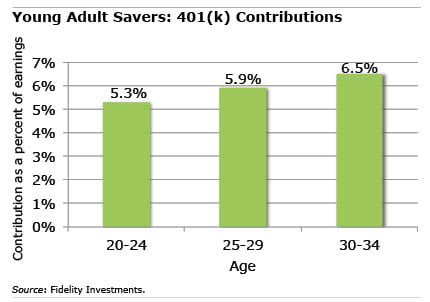
Will Millennials Be Ready to Retire?
As he logged on to his online 401(k) retirement account, Jordan Tirone, a 25-year-old insurance underwriter, explained the mental accounting behind his 5 percent contribution.
He pays $300 a month to live with his mother so he can pay off student loans. Nevertheless, a regular paycheck from his Hartford, Conn., employer is finally giving him some financial stability. “I’m feeling like I’m gaining some traction,” he said.
Spontaneously, he clicks his mouse and increases his contribution to 6 percent of his salary.
Although it can be difficult to focus on a retirement that is still 40 years away, many young adults like Tirone try very hard to save. But are they doing enough? A lot of evidence suggests they’re not, either because they can’t afford to, refuse to, or don’t know what to do.
 Adults in their 20s and early 30s, in a recent survey of 401(k) participants by Brightwork Partners LLC, predicted they would have to rely on their personal savings for half of their income in retirement.
Adults in their 20s and early 30s, in a recent survey of 401(k) participants by Brightwork Partners LLC, predicted they would have to rely on their personal savings for half of their income in retirement.
Their 401(k) contributions don’t square with their expectations. Data on retirement plans administered by Fidelity Investments show that adults in their late 20s contribute 5.9 percent to their 401(k)s; by their early 30s, that increases to 6.5 percent.
But a typical 25-year-old who wants to retire at age 67 should contribute anywhere from 10 percent to 12 percent of his pay, according to various estimates. This assumes the worker who retires will need to replace 75 percent to 80 percent of his pre-retirement income, taking into account his lower expenses and what he can expect from Social Security. [A young adult who holds high-interest credit cards or other debt may want to make lower contributions temporarily, while paying them off.]
Surveys have shown that young adults are diverting money that might go to retirement to paying their student loans. Lou Chong, a financial planner with Wedgewood Wealth Counsel in Framingham, Mass., who administers three small company 401(k)s, said they have other pressing needs, such as buying a house or a car.
When it comes to retirement, “They don’t have the urgency of people in their 50s,” Chong said.
What Brightwork founder Ron Bush found interesting in his firm’s survey is that young adults estimate that employment will provide 14 percent of their “retirement” income – that’s double the prediction by adults who are on the verge of retiring today. Working, said Bush, “is a rational way” for young workers “to plug the gap.”
If they don’t start saving more, many Millennials won’t have a choice.
Comments are closed.







A new study by the Transamerica Center for Retirement Studies says the inability of 20-somethings to save for retirement is a worldwide problem.
http://www.plansponsor.com/Young_Workers_Want_to_Save_Lack_Capital.aspx
To quote the PlanSponsor story: “Chief among young workers’ roadblocks to a secure retirement are high levels of student debt and scarce job prospects.”
The study also showed that the young believed employer savings plans were important when seeking employment.
They just wish they could afford to save in them.
Actually, given that their Social Security and Medicare benefits will likely be cut, isn’t saving 30 percent of their (lower) pre-tax incomes for retirement, in addition to any money set aside to save for a downpayment and the kid’s college, more reasonable?
Don’t forget the higher tax burden.
They also need to spend more to stimulate the economy.
Outstanding article. I know I had it tougher than my parents and I worry about my kids.